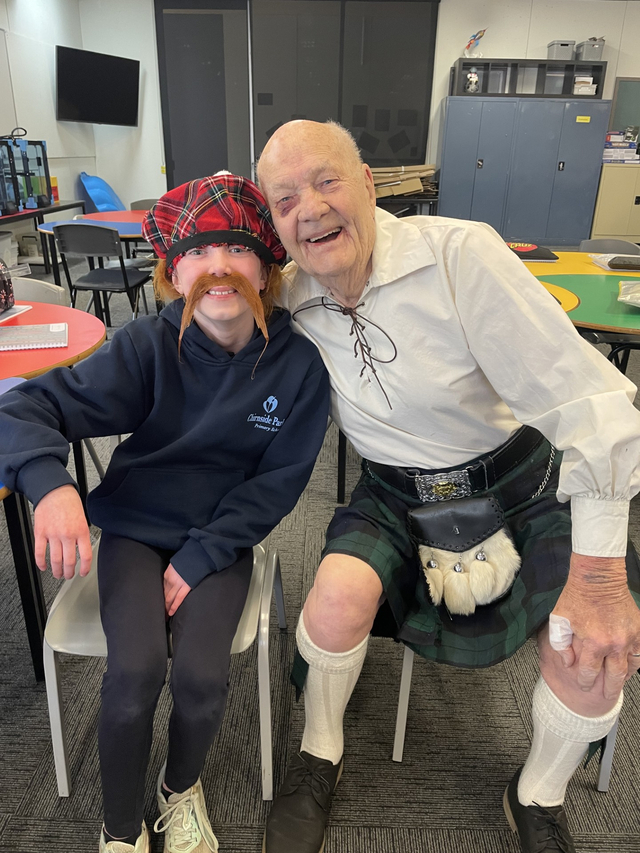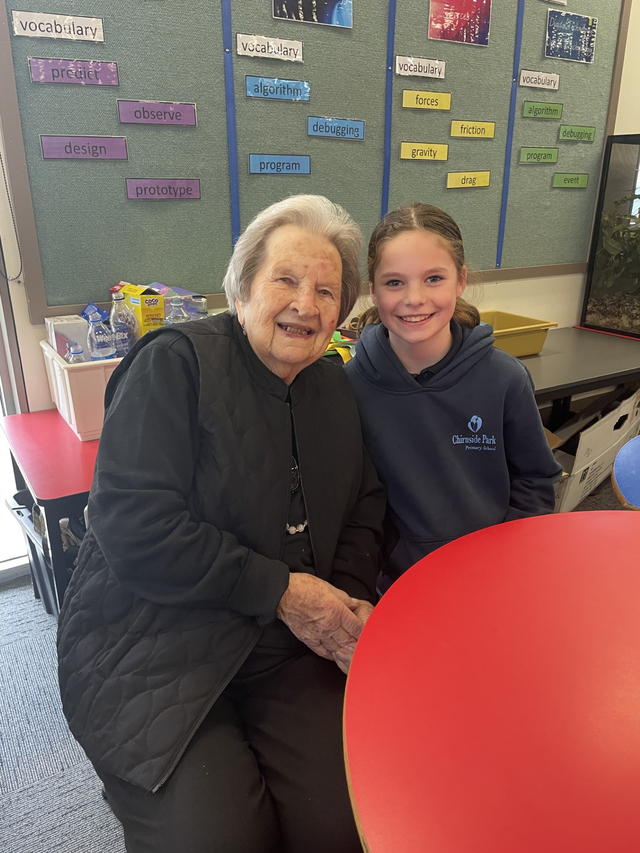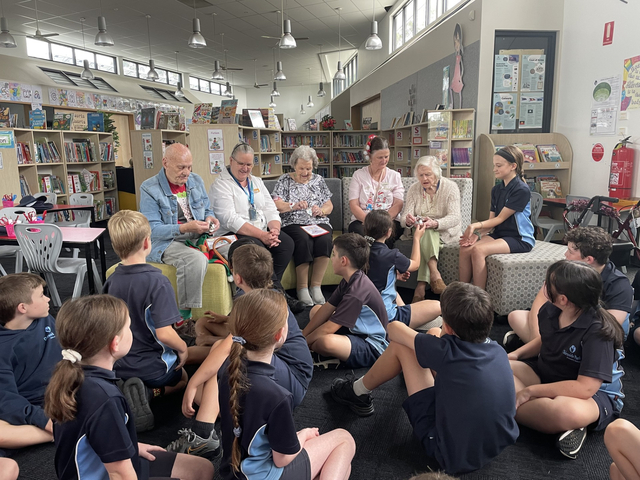
By Mikayla van Loon
Creating intergenerational links and inspiring a sense of connection, resilience and empathy has been the focus of a year-long program bringing primary school students and aged care residents together.
Every fortnight Chirnside Park Primary School welcomes six or seven residents from Bolton Clark’s Lilydale Aged Care home to learn alongside the Grade 3s and 4s as they complete lessons from The Resilience Project.
Grade 3/4 team leader and teacher Natalie Cincotta said the progression of having the residents visit every second Monday happened quite organically after seeing the students connect so viscerally with them.
“Last year we read a book in class, and it was set in a retirement home and then we showed them a video of an ABC show where the data was saying 40 per cent of residents don’t have visitors,” she said.
“So to really relate it to the real world we invited some residents to come to the school and they came for just a one off, Q and A. We just tried to make them feel special.
“The kids created questions and asked them about their lives and their time at the home and all those sorts of things. The kids loved them so much and were so buzzed afterwards that we were like, ‘we wonder if we could do something more with this’.”
Two of the regular visitors to the school, Trudy Jones, 104, and Bob Craig, 90, both said their fortnightly visit was an absolute highlight of their week and month.
“It’s absolutely my world at the moment. They’re lovely, they’re beautiful children,” Trudy said.
“I am not there to teach, I’m there to learn. I enjoy it very much. I always feel good,” Bob said.
Stepping into a modern day classroom for the first time last year, Bob and Trudy said they were truly astonished by the layout, the technology and the togetherness of the students.
“When I saw the screen and I said to them, ‘I had a slate and pencil, no ink, no nothing’. And my counting things were like little cubes in a bag and they give you those, that’s all that I had,” Trudy said.
“When I went to school, the clever people were at the top and the not so clever were at the bottom. We all sat in pairs. But there’s no brightest and dumbest. Natalie gets the kids to work together, where the bright ones are helping the not so bright,” Bob said.
The enjoyment of seeing the residents every fortnight is reciprocated by the students, saying they love seeing the smiles on their faces each time they visit.
“My favourite thing about The Resilience Project is getting the people from the retirement home to come see us because I can see that it lights up their day as well as us,” one student said.
“We ask them about their week, we ask them about their day, and Miss Cincotta picks a buddy for both of them. So everyone gets to be their buddy, and then if you’re their buddy, you get to do an activity with them,” another student said.
In classic Bob style, as the aged care home’s resident jokester, sometimes he will come dressed in a costume to make the children smile and laugh, something they love.
But more than that, each lesson focuses on an element of gratitude, empathy, mindfulness and emotional literacy and the students said since doing The Resilience Project they feel happier.
“Each of the lessons we do, we focus on one of them and we watch a video that links to an activity in our book,” Alira said.
“Doing The Resilience Project helps us, or some people who may have emotional needs, to really take control of those emotions, to say that you are stronger than your emotions and you can control them.”
Embracing the techniques of mindfulness at home and in school, like giving happy or thoughtful notes to family and friends, adopting healthy habits like reading or going to bed earlier and breathing exercises.
“When we were talking about the big elephant problem and the little ant problem, sometimes at home I calm myself by doing finger breathing,” Aria said.
Picking up their own lessons from the sessions but also being able to connect their life story to situations, Bob and Trudy said, is an incredible privilege for them because this type of learning is so far beyond what they were taught at school.
“Hopefully I am contributing to it because of the years I’ve been on this planet and what I’ve experienced. Everything they show, I have been there, done that.
“And they have a discussion about how you can make a person feel comfortable. Smile, use their name. Call them by name and smile, they immediately feel a bond. So I go around smiling, and there’s an amazing number of people who smile back at you.”
Having some tough life experiences, Bob and Trudy use that to showcase resilience and the importance of gratitude.
“My life was pretty rough. I was 10 when my father walked out on us. I had a little brother, and he became my responsibility because my mum had to go and work,” Bob said.
“I left school at 15 because I had to go and get a job. I had an inferiority complex. Other people would talk about their dads and I was the dad to a brother who was eight years younger than me.”
Bob’s life was vastly different from that of the students he now gets to bond with.
He was called up in his late teens by the Royal Air Force to do national service and was posted to Korea and Singapore. He was goalkeeper in the Force’s football team and played in a pipe band.
Bob met his wife of 66 years when he was 18 and she was 16, they were both in their early 20s when they married and travelled from Scotland to Australia in 1960 with two young children.
“Family is pretty important to me having come from a broken home. We’ve got three kids, eight grandkids and now we’ve got five great grandchildren,” Bob said.
“My life experiences, having lived in the forces, lived in Asia, being part of a big group of young males playing team sport, I’ve had a lot I can pass on to the kids within reason, bringing it down to their level.”
Trudy also had a similar trajectory in life, growing up in Southport in Lancashire England, leaving school at 14-years-old and finding herself joining the Army.
“My mum said, ‘well what do you want to do?’ So I said ‘shorthand typing’ so I found somewhere I could learn it and I learned more there than I did at school but school was old fashioned then, it’s not like today,” she said.
Her husband was a tail gunner in the air force, while she worked as a clerk in the Army. In 1950 they made the voyage to Australia.
“It was just after we’d come out of the forces that we came to Australia. I got married when I was 21 and I was married nine years before my daughter was born and then I had my son here in Australia,” Trudy said.
Starting their life in Australia was an adjustment, landing in Sydney before moving to a remote part of the country, on the border of Queensland and New South Wales, to a town called Mungindi.
“I lived there way out in the bush. I learned to go to the toilet in the ground. But we mixed in and we took it all in. We didn’t even have the clothes to go out there. My husband said, ‘I think I should have shorts on’ because shorts were a no no in England.
“We were miles away from a shop or anything. We had to wait till somebody came in from the town of Moree. They came with the bread every now and again and so I ordered shorts. I never dreamed of wearing shorts.”
Eventually Trudy and her husband moved to Mount Dandenong in Victoria, where they lived happily for many years.
Despite hardship and having to live far away from her family in England, with her own children close by and the new life she started in Australia, her major life lesson has been to “just take it as life comes because it’s been a wonderful life”.








